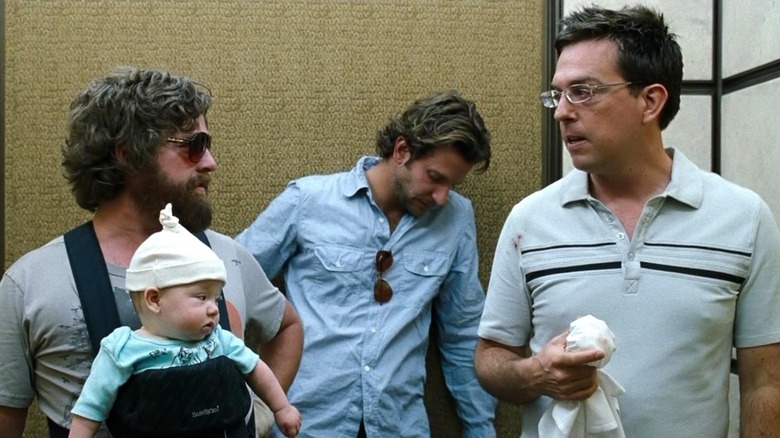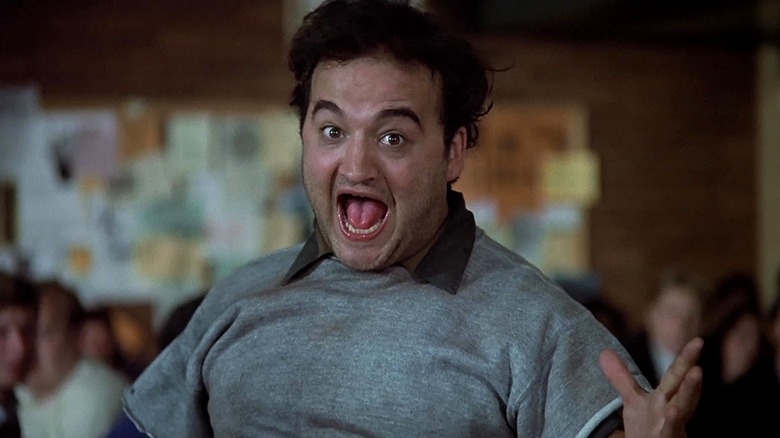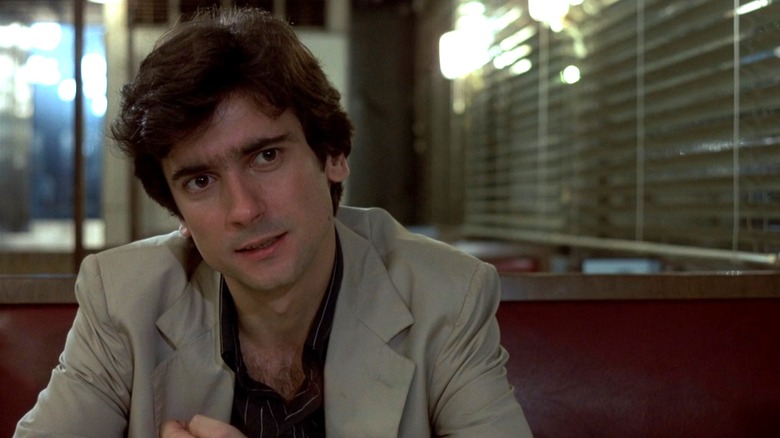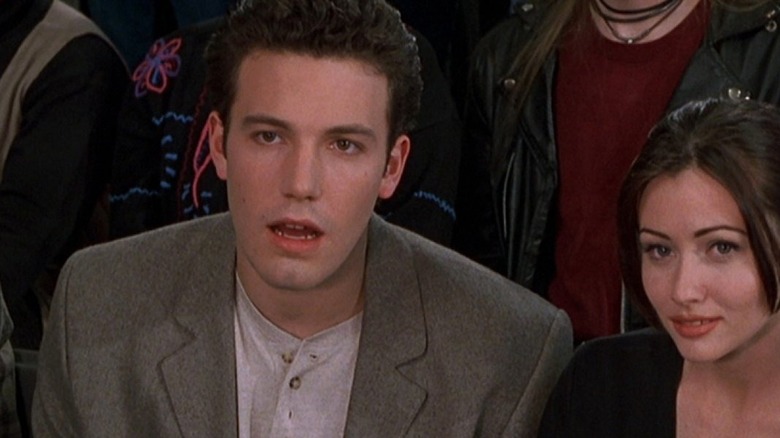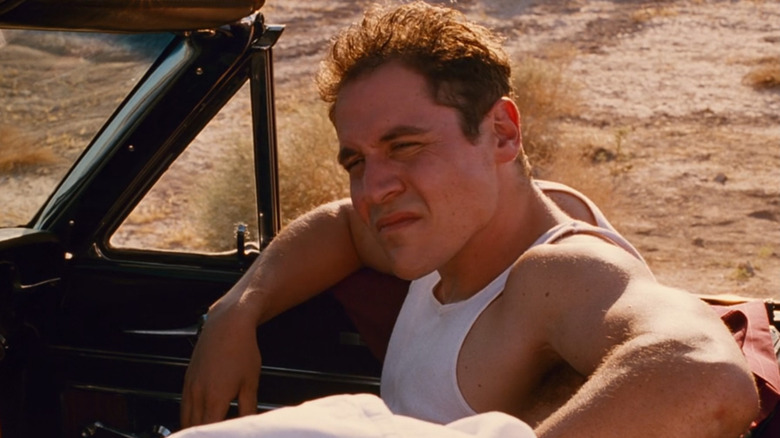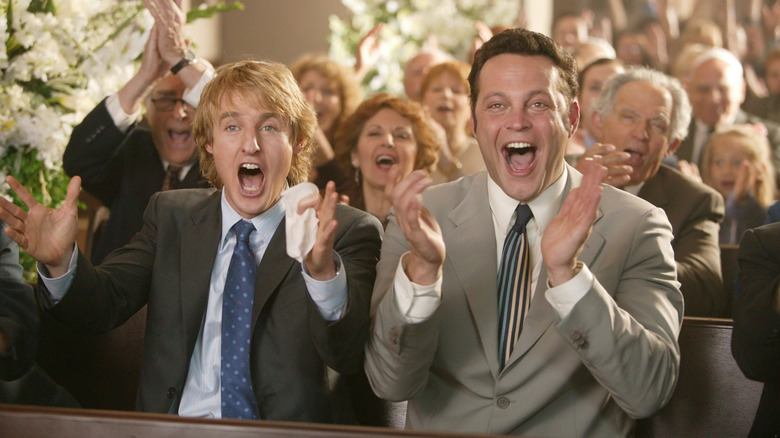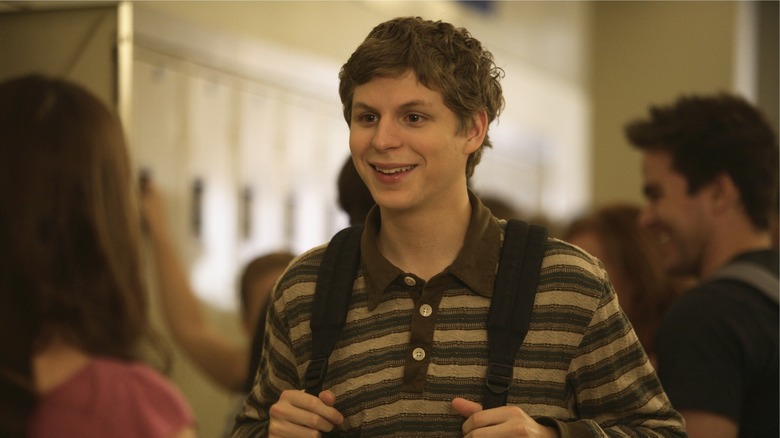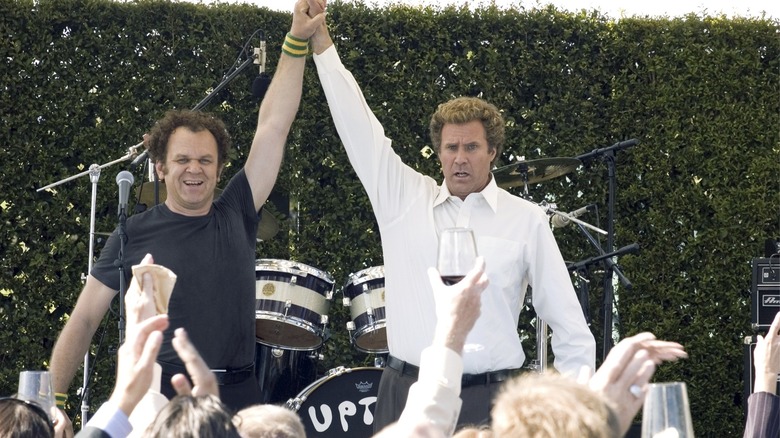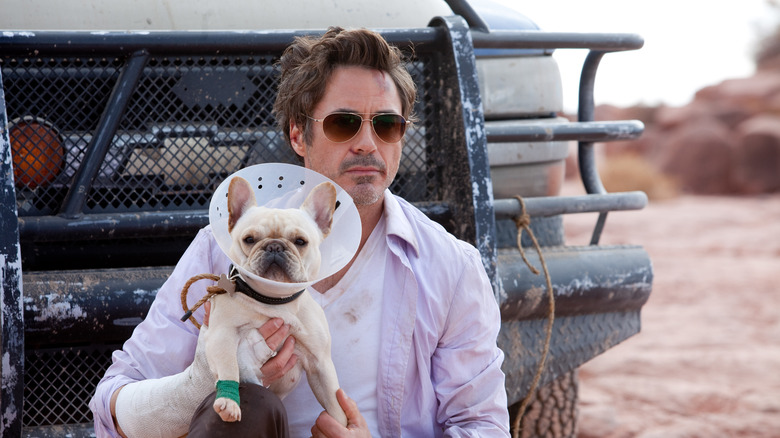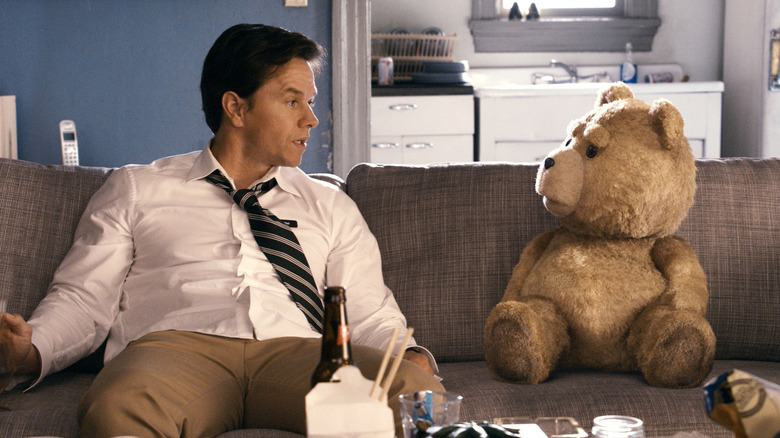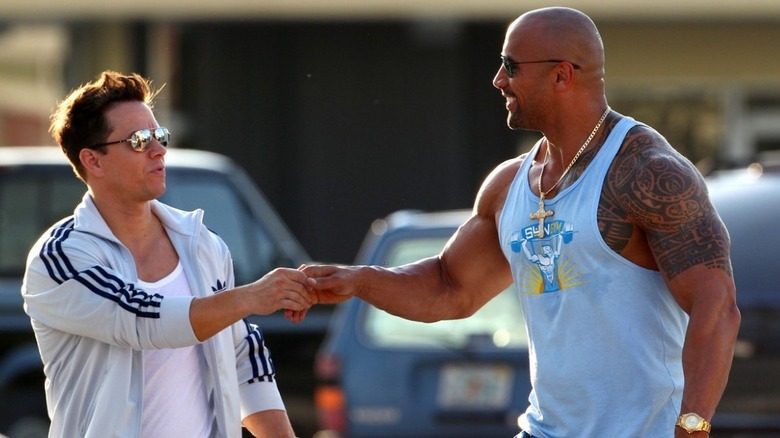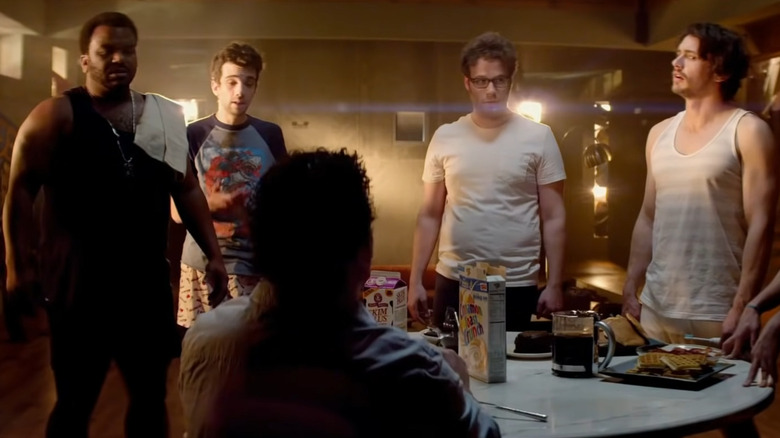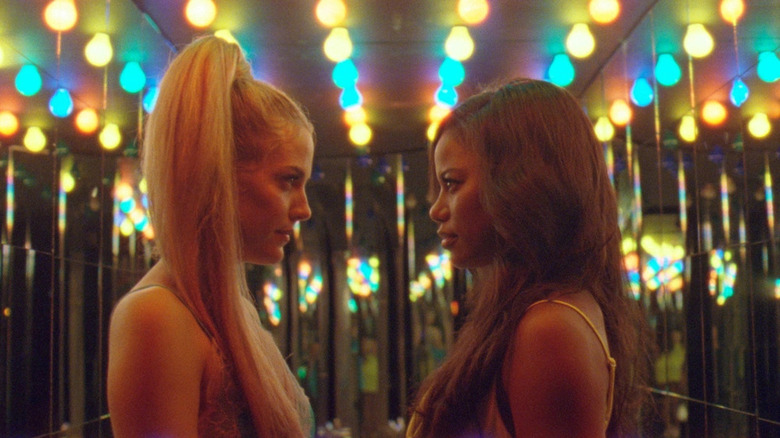12 Movies Like The Hangover That Are Absolutely Hilarious
We may receive a commission on purchases made from links.
"The Hangover" is one of the most influential comedy films of the 21st century and certainly one of the raunchiest. While comedies have been testing the boundaries of acceptable content since their inception, "The Hangover" truly showed audiences something they had never seen before. Part of the reason the film became so iconic is that it was an event. You simply had to see what type of debauchery Phil Wenneck (Bradley Cooper), Stu Price (Ed Helms), Alan Garner (Zack Galifianakis), and Doug Billings (Justin Bartha) managed to get up to after a bachelor weekend goes awry. The cast and crew of "The Hangover" have gone on to find even more success. For example, Bradley Cooper received praise for his powerful turns in titles like "Silver Linings Playbook," "American Sniper," "A Star Is Born," and "Maestro." Director Todd Phillips has also gone on to more serious movies with "Joker" and its musical sequel.
Even though "The Hangover" is just 15 years old, it's hard not to feel somewhat nostalgic about the ridiculous R-rated comedy. In the modern cinematic landscape, comedy films have underperformed financially, and they're often sent to streaming services instead of theaters. Laughing with a packed audience of moviegoers is an experience that many cinephiles long for again. But while we can't fix Hollywood, we can recommend some movies that'll tickle your funny bone in an R-rated way. If you loved "The Hangover," make sure to check out these hilarious comedies as well.
Animal House (1978)
Similar to "The Hangover," almost every member of the cast and crew of 1978's "Animal House" went on to become an influential figure within the world of comedy. The project was spearheaded by "National Lampoon" co-founder Douglas Kenny and directed by John Landis. Similar to Todd Phillips, Landis found a way of inserting social satire into a film that had no shortage of gross-out moments, all while reflecting on how the outsiders, weirdos, and outcasts of Faber College might be smarter than the supposedly "prestigious" Omega Theta Pi fraternity.
Both "Animal House" and "The Hangover" feature a group of complete goofballs that you can't help but root for. Even though they're up to no good, the members of Delta Tau Chi aren't overtly malicious. They manage to accept Larry Kroger (Tom Hulce) and Kent Dorfman (Stephen Furst) into their ranks when no one else will. Both films celebrate and satirize the nature of male friendships, where — despite their bickering — the characters have a genuine affinity for each other. "The Hangover" is filled with incredible moments of physical comedy that feel somewhat inspired by the amazing work that John Belushi does in "Animal House." His character, "Bluto," manages to rally his friends as they get into all types of trouble. There's an amusing footnote noting that Bluto went on to become a member of the U.S. Senate. That somehow seems pretty realistic in the 21st century.
After Hours (1985)
Todd Phillips has often talked about the influence of the great director Martin Scorsese on his career. "Joker" is in many ways a tribute to both "Taxi Driver" and "The King of Comedy," and "War Dogs" feels like a mash-up of "Goodfellas" and "Mean Streets." However, the Scorsese film that feels closest in tone to "The Hangover" is actually one of the more underrated projects of his career. Although Scorsese is best known for his gripping crime sagas, he took a swing at outlandish comedy with his 1985 romp "After Hours."
Like "The Hangover," "After Hours" takes a simple premise and escalates it into absurdity. After Paul Hackett (Griffin Dunne) goes on an awkward date, he is unable to return home as he gets caught up in various misadventures in New York City's SoHo district. Similar to what happens to the gang in "The Hangover," almost everything that could possibly go wrong for Paul goes wrong. It's hilarious to watch his luck get even worse as the story goes on. While the cast of "The Hangover" bounce off of each other's energy, Dunne carries the entire film on his shoulders. He's both pathetic and endearing. Both Scorsese and Phillips were able to analyze male anxiety, and Paul begins to feel the pressure to be more "masculine" as he's preyed upon during his adventure.
Mallrats (1995)
There's a strong connection between the films of Todd Phillips and Kevin Smith. Both directors like to tell stories about raunchy, somewhat obnoxious characters who somehow manage to be endearing. They are also keen to insert a fair amount of pop culture references into their films. Phillips may have written and directed the DC comic book film "Joker," but Smith is one of the biggest "Batman" fans on the planet.
In many ways, Smith's 1995 film "Mallrats" feels like "The Hangover" for a younger generation. "The Hangover" explores the anxiety that men face when they reach middle age, with characters feeling like the independence of their youth will disappear, while "Mallrats" follows a group of younger men who struggle to grow up. Dating, finding jobs, and deciding on a future is all pretty daunting if you're more worried about comic books than adult responsibilities. Both films show the maturation process in hilarious detail and give the characters a chance to learn from their mistakes.
"Mallrats" is the second film in Smith's "View Askewniverse" after 1994's "Clerks." The film follows T.S. Quint (Jeremy London) and Brodie Bruce (Jason Lee) as they contemplate their futures. Like "The Hangover," "Mallrats" forces these characters to evolve before they start dating again. While Phillips failed to capture the magic of the first film with "The Hangover Part II" and "The Hangover Part III," hopefully Smith won't have these problems with "Mallrats 2" if he can ever get it made.
Swingers (1996)
"The Hangover" is one of the weirdest mid-life crisis movies ever. Phil, Stu, Alan, and Doug are all looking forward to spending a weekend together away from their usual responsibilities, and they're forced to pay the consequences for their debauchery. This is a similar theme to the one presented in the 1996 classic independent comedy "Swingers." While "The Hangover" is pretty absurd with its ridiculous plot twists, "Swingers" is actually a pretty realistic look at dating, working as an actor, and life in Los Angeles. Both films are hilarious in their own ways, but "Swingers" tells a slightly more relatable story.
"Swingers" follows the aspiring comedian Mike Peters (Jon Favreau) and his best friend, the working actor Trent Walker (Vince Vaughn), as they attempt to "make it" in the social scene of the 1990s swing revival. Comedy films are generally products of the era they were released in. "The Hangover" includes references to social media and technology that ground it in the early 21st century, and "Swingers" now feels like a great throwback to 1990s swing culture. The attention to detail that Todd Phillips and "Swingers" director Doug Liman paid to fleshing out the environments made both films feel like excellent time capsules. Both "Swingers" and "The Hangover" feature actors with such great chemistry that it feels like they're best friends in real life. This was actually the case with "Swingers," where Favreau met Vaughn on the set of "Rudy" and based the screenplay on his real experiences.
Wedding Crashers (2005)
"The Hangover" looks at what can happen when irresponsible men get in over their heads. Phil, Stu, Alan, and Doug weren't necessarily looking to go on a wild road trip adventure, but a night of drinking gone awry comes back to bite them. This is a common setup in comedy films, but few are able to keep raising the stakes throughout. However, "Wedding Crashers" is one of the standout studio comedies of the early 21st century. Like "The Hangover," "Wedding Crashers" took the audience off guard with its surprising gags, cameos, and sincerity.
Although Owen Wilson and Vince Vaughn have starred in several films together, "Wedding Crashers" is the strongest of their collaborations. The film follows two bachelors, John (Wilson) and Jeremy (Vaughn), who attend various wedding ceremonies in order to seduce women. While they're not looking to form any long-term relationships, the pair get in over their heads when they start romancing Claire (Rachel McAdams) and Gloria (Isla Fisher), the daughters of the U.S. Secretary of the Treasury William Cleary (Christopher Walken). Many of the most amusing moments in "The Hangover" are when the gang has to lie to cover up their misadventures. It's pretty hard for John and Jeremy to lie about their military service when they're talking to an actual veteran like Cleary. Both films show how resentment can grow between lifelong pals. Although John begins to fall in love with Claire, Jeremy wants to get as far away from Gloria as possible.
Superbad (2007)
If "The Hangover" is about middle-aged men who get into childish antics, then "Superbad" is about teenagers who get saddled with adult responsibilities. If you ever thought that you got into trouble in high school, it's nothing compared to the shenanigans that Evan (Michael Cera), Seth (Jonah Hill), and Fogell (Christopher Mintz-Plasse) get into in "Superbad." "Superbad" is a quintessential merging of two different subgenres of comedy; it has all the ridiculous gross-out gags of "The Hangover" but the sincerity within the central relationship that feels closer to the films of John Hughes.
"Superbad" follows a group of teenage boys as they attempt to get into parties right before they leave for college. Like "The Hangover," the story revolves around characters who are trying to make the most of the time they have left together. Evan and Seth fear that they have missed out on the opportunities that they should have had in high school. The film gets more serious when Seth realizes that he and Evan will not be attending the same college. It's actually a very heartfelt examination of the struggles that come with growing up since Seth and Evans' final farewell to each other at the end of the film is very moving. Although Todd Phillips and "The Hangover" have been criticized for the depiction of female characters, "Superbad" does a great job promoting its female co-stars. Emma Stone gives one of her breakout performances as Jules, the girl who wins Seth's heart.
Step Brothers (2008)
"The Hangover" gleefully lets men act like absolute children. There's something to respect about films that don't try to hide how immature they are, and "Step Brothers" is definitely one of them. Adam McKay's uproarious 2008 comedy looks at middle-aged men who are still in an adolescent phase. Brennan (Will Ferrell) and Dale (John C. Reilly) are forced to live together after their parents decide to get married. Brennan is fiercely loyal to his mother, Nancy (Mary Steenburgen), and Dale lives in fear of the wrath of his father, Dr. Robert Doback (Richard Jenkins). Neither of them are prepared to be "stepbrothers."
"The Hangover" features some incredible feats of physical comedy, but "Step Brothers" rivals it thanks to Ferrell and Reilly's commitment. Both films have a very dark sense of humor. At one point, Brennan tries to bury Dale alive, and Dale kicks Brennan off of a boat. It's hilarious to watch these two "man-children" bicker and argue, but the film really kicks into another gear when they realize how much they have in common. When their parents force them to get jobs, Brennan and Dale have to team up to silence their doubters and stand up to bullies. Both "The Hangover" and "Step Brothers" make no apologies for their characters. Brennan and Dale are absolute monsters, but they're hardly the worst that society has to offer. It's particularly rewarding to see them get revenge on Brennan's abusive brother, Derek (Adam Scott).
Due Date (2010)
Although Todd Phillips would ultimately head into more dramatic territory with "War Dogs" and "Joker," he still made one last great comedy with 2010's "Due Date." While the sequels to "The Hangover" felt like they were repeating many of the same jokes, "Due Date" actually used "The Hangover" formula and took it in a new direction. It's a slightly more heartwarming story than "The Hangover," but "Due Date's" sincerity doesn't come at a cost to its comedy. The film pits two polar opposites against each other and forces them to team up in a very tumultuous road trip misadventure.
The premise is pretty similar, as anything that can go wrong does go wrong. Awaiting the birth of his child, architect Peter Highman (Robert Downey Jr.) gets on a flight from Atlanta to Los Angeles. After he gets annoyed with the eccentric passenger Ethan Tremblay (Zach Galifianakis), Peter finds himself kicked off the flight. Phillips understands that stakes are essential to making a good comedy. In "The Hangover," Doug is trying to get back in time for his wedding, and in "Due Date" Peter wants to witness his child's birth. Making the characters even more stressed helps make the scenarios funnier. Galifianakis doesn't just emulate his performance as Alan. Ethan is shy and oddly sensitive, and his strange truisms about life are actually quite endearing. The conversations he shares with Peter about their fathers give the film some genuine emotion.
Ted (2012)
In terms of raunchy comedy "auteurs" of the 21st century, Todd Phillips' closest rival is Seth McFarlane, who changed the comedic landscape forever with his TV shows "Family Guy," "The Cleveland Show," and "American Dad!" When McFarlane finally made the transition to directing feature films, he used the concept of a children's story and took it in an R-rated direction. "Ted" is about a young boy whose teddy bear comes to life. When both John (Mark Wahlberg) and Ted (McFarlane) grow up, they find themselves at an impasse where they might have to part ways.
"The Hangover" celebrates "bromance," and "Ted" looks at how childhood friendships evolve. John and Ted learn that they've gotten to know each other a little bit too well. John doesn't want to keep cleaning up Ted's messes, he wants to move on with his life. Of course, seeing an adorable teddy bear curse, smoke, and seduce women is inherently funny. However, McFarlane is able to give the film legitimate stakes when John considers leaving Ted behind so that he can be more committed to his girlfriend, Lori Collins (Mila Kunis). Both films were able to take the audience off guard with the development of crime storylines. The guys in "The Hangover" get into trouble with the mafia when they run into the Chinese gangster Mr. Chow (Ken Jeong). There's a humorous storyline in "Ted" when the obsessive stalker Donny (Giovanni Ribisi) tries to kidnap Ted. Ribisi's serious demeanor makes the character even funnier.
Pain & Gain (2013)
One of the reasons that "The Hangover" is so funny is that it keeps doubling down on its own absurdity. While it certainly surpasses believability, the film is grounded in just enough reality to make it not feel like a cartoon. If "Pain & Gain" was based on an original screenplay, it would be seen as completely unbelievable. However, Michael Bay's 2013 satire is actually based on the true story of one of the craziest crimes in modern American history.
Bay is a filmmaker who has often been criticized for his immaturity, but with "Pain & Gain" he satirizes it. Daniel Lugo (Mark Wahlberg) is a workout obsessive who is obsessed with a materialistic desire for wealth, success, and admiration. Lugo's insecurity about his own masculinity drives him to plan a kidnapping of the wealthy man Victor Kershaw (Tony Shaloub). Similar to the characters in "The Hangover," Lugo has absolutely no idea what he's doing. After recruiting Paul Doyle (Dwayne Johnson) and Noel Doorbal (Anthony Mackie) to join his heist crew, Lugo finds himself caught up in a criminal conspiracy. Both films are gleeful in their shocking moments. While "The Hangover" has a more light-hearted tone, "Pain & Gain" features some truly morbid death sequences.
This Is the End (2013)
There's a gleeful immaturity to the characters in "The Hangover." It's very amusing to see the version of themselves that Phil, Stu, Doug, and Alan present in public, and then see what they're like when they have no restrictions. This is a humorous device that also works in favor of "This Is the End." The 2013 comedy stars Seth Rogen, Jonah Hill, Jay Baruchel, James Franco, Danny McBride, Craig Robinson, and Emma Watson as exaggerated versions of themselves.
"The Hangover" may have kicked off with some wild shenanigans, but the stakes in "This Is the End" are literally apocalyptic. The film follows a group of celebrities as the world falls apart, and it's hilarious to see how out of touch these stars are with reality, only thinking of materialistic urges when facing life-and-death scenarios. It's also funny to see celebrities poke fun at themselves by acting like complete imbeciles. "The Hangover" features some surprising moments of violence that take the story in a darkly comedic direction. "This Is the End" has a similarly morbid sense of humor, as several famous faces get annihilated during the disaster.
Zola (2021)
"The Hangover" feels like it was based on a wild story that emerged on social media. While Twitter has its fair share of exaggerated stories, the infamous 2015 thread by the stripper Aziah King (also known as Zola) was so ridiculous that it went viral and inspired a "Rolling Stone" article. The thread and article inspired the feature film adaptation "Zola," which debuted at the Sundance Film Festival in 2020 and hits theaters in the summer of 2021.
The film follows the stripper Zola (Taylour Paige) as she goes on a raunchy road trip with her fellow performer Stefani (Riley Keough) and her boyfriend Derrek (Nicholas Braun). Unfortunately, Stefani's love life gets a little more complicated, and Zola finds herself in the middle of a crime ring. If you thought that "The Hangover" gang's activities were embarrassing, wait until you see the shenanigans that Stefani drags Zola into. First-time director Janicza Bravo does a great job of making the story shocking until the very end.
